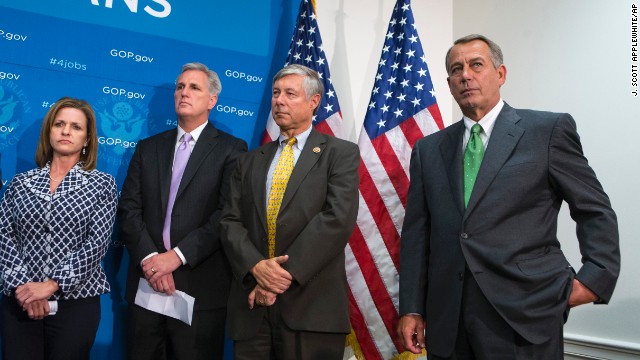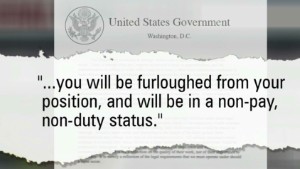
- Paul Begala asks which party is more united, mainstream and reasonable
- Begala says that's the way to see who's winning shutdown, and Democrats win
- He says majority of American voters don't want to shut down the goverment over Obamacare
- Begala: Obama should insist avoiding default is first priority before negotiating
Editor's note: Paul Begala, a Democratic strategist and CNN political contributor, was a political consultant for Bill Clinton's presidential campaign in 1992 and was counselor to Clinton in the White House.
(CNN) -- As Washington hurtles toward a government shutdown, the go-to move for the uninformed is to blame both sides equally. Just say, "A pox on both their houses," and you can get through any neighborhood barbecue or TV talk show.
But what if you really want to know what's happening? There are three metrics you should track if you want to know who will come out ahead in a government shutdown:
Which side is more united?
One of President Clinton's laws of politics is: "Democrats want to fall in love, Republicans just want to fall in line." Which is what makes the GOP fratricide so interesting.

Savaging your colleagues, undermining your leaders, backbiting and backstabbing -- these are usually Democratic specialties. But not now. Credit the strong leadership of House Democratic Leader Nancy Pelosi and Senate Majority Leader Harry Reid with keeping a remarkably diverse Democratic Congress together. When you can keep a strong conservative like Sen. Joe Manchin of West Virginia on the same page with the powerfully progressive Rep. Keith Ellison of Minnesota, you are definitely winning.
Meanwhile, the GOP, whose members range from conservative to ultraconservative, is at war with itself and its leaders. Sen. Ted Cruz of Texas led the fight on the Senate floor to block consideration of the funding bill. But after a pointless 21-hour talkathon, the majority of his GOP colleagues rejected Cruz's strategy. Senate Republicans split badly and bitterly; 25 voted against Cruz while just 19 voted with him.
In the House, it is chaos. The Neanderthals are fighting the Cro-Magnons and the Homo erectus tough guys are fighting the australopithecines.
Which side is more mainstream?
A majority of voters don't like the Affordable Care Act -- although that's a bit misleading, because a percentage of them dislike it because they think it doesn't go far enough.
 Road blocks in debt ceiling compromise
Road blocks in debt ceiling compromise  No game plan to avoid a shutdown
No game plan to avoid a shutdown  What happens to workers in shutdown?
What happens to workers in shutdown? I like it -- in fact, I love it -- but that's not the point of this column. Obamacare clocks in at just 29% support in a recent CNBC poll. So you'd think that the Republicans' position of repealing the ACA would be more mainstream. But you'd be wrong.
That same CNBC poll shows that Americans oppose defunding Obamacare, with only a little more than one-third of voters saying they want it defunded. They want to mend it, not end it.
What's worse for the Republicans, when the question shifts to whether you support shutting down the government and/or defaulting on U.S. debt in order to kill Obamacare, the GOP position loses by a crushing 59 to 19 percentage points. When you're down to just 19% of your countrymen and -women supporting your crusade, it's time (as we say in Texas) to pee on the fire and call the dogs: The hunt's over.
That is, no doubt, why the House Republicans have retreated to their new position: delaying Obamacare for a year rather than outright defunding it. But health care delayed is health care denied, and it's a bit of a reach to demand a one-year delay in the president's top domestic priority in exchange for funding the government for 10 weeks.
Which side is more reasonable?
It is hard to seem reasonable when you are pursuing a strategy that even conservative Republicans like Sen. Richard Burr called "the dumbest idea I've ever heard of." Keep in mind this is from a man who represents North Carolina, where the Republicans proposed a law barring federal courts from interpreting the Constitution, and allowing the North Carolina Legislature to declare a state religion. (Which might have passed had they chosen the right religion for the Tarheel State: college basketball.)
And yet there is hope for the GOP here. Every time the president says "I will not negotiate on the debt ceiling" -- a phrase he utters even more often than "Just pass me the ball, Joe, I'm open!" -- he risks looking unreasonable.
As a matter of substance, I strongly agree with his position. But as a matter of rhetoric and positioning, he would be better served to state his position this way: "I will gladly listen to any idea to improve the Affordable Care Act, or reduce the deficit, or any other ideas my Republican friends might have. But first we have to avoid default. That means paying the bills that Congress has already incurred. Once we've done that we can negotiate on anything."
Same substantive position: Negotiations on policy come only after the nation avoids default. But this formulation emphasizes the president's willingness to be flexible on improving the ACA and other Obama priorities.
Of course, nothing is certain in life. But if I were a betting man, I'd bet on President Obama and the Democrats in this fight. As long as Republicans appear more divided, more extreme and more unreasonable, they are going to lose. And then they will look weak as well.
Follow us on Twitter @CNNOpinion.
Join us on Facebook/CNNOpinion.
The opinions expressed in this commentary are solely those of Paul Begala.
via CNN.com - Top Stories http://rss.cnn.com/~r/rss/cnn_topstories/~3/TAOdcNgzex4/index.html
No hay comentarios:
Publicar un comentario